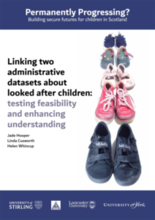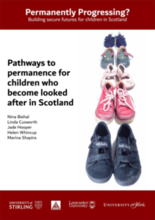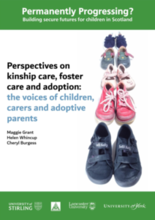

Displaying 791 - 800 of 1648
This report on the linkage of Children Looked After Statistics (CLAS) with data from Scottish Children’s Reporter Administration (SCRA) is one strand of the Permanently Progressing? study. The study is the first in Scotland to investigate decision making, permanence, progress, outcomes and belonging for children who became ‘looked after’ at home, or away from home (with kinship carers, foster carers or prospective adopters) when they were aged five and under.
This report presents the findings from strand one of the Permanently Progressing? study, Pathways to Permanence for children who become looked after in Scotland. This strand analysed data from the Children Looked After Statistics (CLAS) provided to the Scottish Government by all 32 local authorities on the total cohort of children who became looked after during the year 1 August 2012 - 31 July 2013 when they were aged five and under
This report has been completed as one part of the study Permanently Progressing? Building secure futures for children in Scotland which heard directly from children about their experiences.
After almost five years of detailed research and analysis, the reports of the Permanently Progressing study (phase one) were published on 20 June 2019. The study investigated decision making, permanence, progress, outcomes and belonging for a large cohort (1,836 children) of all children in Scotland who became looked after in 2012-13, when they were aged five or under.
Guided by the life course principle of expected ‘diversity in life course trajectories’ this paper identifies the pathways taken through education among 18 care-experienced adults (aged 24–36) in Ireland and some of the experiences and events that influenced these pathways.
The content of this Call to Action comes from what was heard from young people with care experience as well as from the professionals working with them. It outlines three primary actions to realize careleavers' rights in the law and in practice and to allocate adequate funds for realizing these rights.
This small pilot project was conducted to start to understand and compare the situation of grandmothers caring for children in a diverse range of countries when their parents are in prison.
In this article the authors attempt to disentangle different aspects of potentially harmful care for looked after children, as well as to discuss potential pathways to more systematically approach and report adverse events for this group.
This paper sets out to explore why formal kinship care has emerged in such a marked way in recent decades by investigating the emergence and development of formal kinship care in two neighboring jurisdictions in Europe where it now accounts for a substantial proportion of all care placements in Scotland and Ireland.
2019 marks the 20thanniversary of Scotland's flagship residential child care conference. SIRCC is an annual event in the calendar for those working with looked after children in Scotland. The conference will be held 4 & 5 June 2019 in Glasgow.




